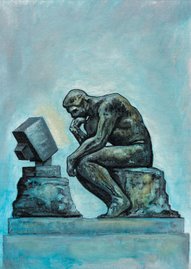4.Dilemma – a syllogism that is both conditional and disjunctive. The major premise is a compound conditional proposition consisting of two or more simple conditional propositions connected by and or its equivalent. The minor premise is a disjunctive proposition that alternatively posits the antecedents (constructive dilemma), or sublates the consequents )destructive dilemma), of each of these simple conditional propositions.
| CONSTRUCTIVE DILEMMA The disjunctive propositions posits the antecedent of the conditional propositions; the conclusion posits their consequents. | |
| 1.SIMPLE CONSTRUCTIVE | 2.COMPLEX CONSTRUCTIVE |
| Either A or B But, if A, then Z; if B, then Z. Therefore Z. | Either A or B. But, if A, then X; if B, then Y. Therefore either X or Y. |
| DESTRUCTIVE DILEMMA The disjunctive proposition sublates the consequents of the conditional propositions; the conclusion sublates their antecedents. | |
| 1.SIMPLE DESTRUCTIVE | 2.COMPLEX DESTRUCTIVE |
| If A, then X and Y But, either not X or not Y. Therefore not A. | If A then X; and if B, then Y. But, either not X or not Y. Therefore either not A or not B. |
- In the simple constructive dilemma, the conditional premise infers the same consequent from all the antecedents presented in the disjunctive propositions. Hence, if any antecedent is true, the consequent must be true. This form is illustrated by the reflections of a man trapped in an upper story of a burning building.
I must either jump or stay – there is no other alternative.
But if I jump, I shall die immediately from the fall.
And if I stay I shall die immediately from the fire.
Therefore I shall die immediately.
- In the complex constructive dilemma, the conditional premise infers a different consequent from each of the antecedents presented in the disjunctive proposition. If any antecedent is true, its consequent is likewise true. But since the antecedents are posited disjunctively and, since different consequent flows from each of them, the consequents must likewise be posited disjunctively. The men who brought to Jesus the woman caught in adultery had this form of dilemma in mind.
Jesus will either urge that she be stoned to death or that she be released
without stoning.
But if he urges the first, he will make himself unpopular with the people
because of his severity.
And if he urges the second, he will get into trouble with the Jewish
authorities for disregarding the law of Moses.
Therefore he will either become popular with the people or get into trouble
with the Jewish authorities.
- In the simple destructive dilemma, the conditional premise infers more than one consequent from the same antecedent. If any of the consequents is false, the antecedent is false. Hence, since the disjunctive sublates the consequents alternatively, at least one of them must be false, and consequently the antecedent must also be false. This type is not distinct from a conditional syllogism in which the consequent is sublated in the minor premise and the antecedent is sublated in the conclusion. Still, on account of the disjunctive premise, it is generally called a dilemma.
If I am to pass the examination, I must do two things: I will study all night
and I must also be mentally alert as I write.
But either I will not study all night or I will not be mentally alert as I write.
Therefore I will not pass the examination.
- In the complex destructive dilemma, the conditional premise infers a different consequent from each antecedent. The disjunctive premise sublates these consequents alternatively, and the conclusion sublates their antecedents alternatively.
If John were wise, he would not speak irreverently of holy things in jest;
and if he were good, he would not do so in earnest.
But he does it either in jest or in earnest.
Therefore John is either not wise or not good.
The dilemma is subject to the following rules:
Rule 1: The disjunctive must state all pertinent alternatives.
Rule 2: The consequent in the conditional proposition must flow validly
from the antecedents.
Rule 3: The dilemma must not be subject to rebuttal.
The alternatively presented in a dilemma are called horns and that a dilemma is sometimes called a syllogismus cornutus or a horned argument. If you show that the first rule us violated, you escape between the horns of the argument.

Nuk ka komente:
Posto një koment